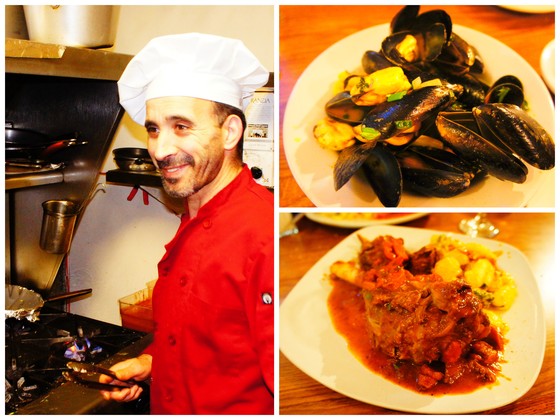Northeast 65th, the east-west thoroughfare that strings together Green Lake, Ravenna, Bryant, Hawthorne Hills, and Wedgwood, is a friendly place for neighborhood restaurants.
The clientele is generally local and not terribly demanding, as they would be for dinner in a destination neighborhood like Capitol Hill. There's a Duke's over by the lake along with Greenlake Alehouse and Perché No; as you head east, there's Da Pino and Bai Pai, there's newcomers Salare and Wataru, and, for about a decade, a modest Italian spot called Casa d'Italia, operated by Anthony and Angeli Donatone.
When the Donatones closed Casa d'Italia and moved on to other ventures, a lot of people came sniffing around: a simple main room with the kitchen in one corner and a patio out back, the sort of spot a hardworking chef could run on their own, with maybe a dishwasher or a busser or a part-time waiter. And the guy who came up with the winning bid to do just that was Abel Hadjal.
Born in the Atlas mountains of Algeria and trained as a cook in Vicenza, in the plains of northern Italy, Hadjal had by early 2013 spent over 15 years in the US. He'd made the rounds of kitchens in Pioneer Square's Little Italy and now, on his own, he pulled together menu elements from across the Mediterranean. Italy, to be sure, but also France and Spain. Also Greece, the Middle East, and North Africa. There would be osso buco and paella and polenta; tortellini and gnocchi and couscous and cioppino.
You could not ask for a more outgoing owner. Hadjal, whom everyone calls Abe, wears a jaunty white chef's cap and a bright red coat; his cheerful demeanor is irresistible. He has opted to name his place Le Zouave, paying honor to the specialized units of North African soldiers who fought in the French army before Algeria's independence in 1962. There were red-jacketed Zouave units in the American civil war as well, fighting ferociously alongside the Union soldiers. Nowadays, "faire le zouave" in French means to "play the clown."
With all of this preamble comes now the time of reckoning, and it pains me to write this: I would have hoped for better.
The food is bland and tentative, without the conviction of flavor. Hadjal seems either unwilling or unable to challenge his clients' palates. The sautéed mussels, normally a foolproof starter, should require nothing more than a bit of chopped onion and a splash of white wine, but they had so little flavor that I was reduced to adding salt to the mollusks. The couscous was similarly bland, accompanied by a half-pound slab of rubbery chicken breast. The lamb osso buco was properly moist (though it too needed salt), accompanied by tough gnocchi garnished with a glutinous cheese topping. By the time I got to the tiramisù, I knew what to expect: ladyfingers laced with flavorless pastry cream without a hint of coffee or Marsala.
The positive side of Le Zouave, aside from the good cheer of its proprietor, are its low prices and large portions. On a cold and blustery night, that might be enough. But if you want the bustle of a genuine neighborhood French bistro, go to Café Presse on Capitol Hill. For a real Italian dinner with homemade pasta prepared by a real Sicilian mamma, go to Mondello in Magnolia. For North African, there's a whole street of Ethiopian restaurants in Little Addis Ababa, along East Jackson.
And let me close with a word or two in defense of salt. There's a reason athletes rehydrate with sports drinks: to restore a balance of electrolytes. But the reason that doctors used to recommend a low-salt diet is that there's so much sodium in industrial food that it can affect the heart. The only long-term effort to reduce salt intake, in Scandinavia a decade ago, produced no reduction whatsoever in coronary disease.
The salt shaker in your kitchen and on your table is not the problem, The problem is the salt that's in the cans and boxes of processed "food" you warm up in the microwave, and in the industrial sludge you eat in fast-food restaurants. All that stuff has way too much salt. You may think you're eating a healthy breakfast if you're putting unsalted butter on whole wheat toast, but there's a good chance you're ingesting 400 milligrams of sodium nonetheless, whereas a boiled egg, even when it's liberally sprinkled with salt, will cost you less than 100.
Salt is not the enemy. Salt is good for you. Human bodies need salt; the cardiologists have finally admitted as much. Good grief. It's not "salt" or "sodium" that kills ya, it's the sewage.
www.zouaverestaurant.com, 2615 NE 65th, Seattle. 206-525-7747

Leave a comment